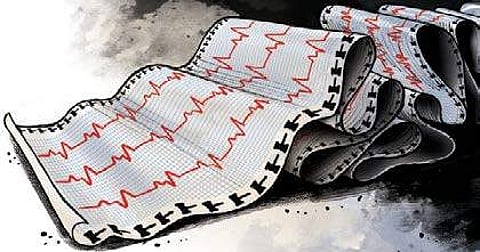Allow us to die with dignity
Responding to a PIL by the NGO Common Cause in the Supreme Court asking that the right to die with dignity be declared a fundamental right, the Central government has opposed the concept of a living will. The reason given by the additional solicitor general was that “it could be enormously misused”. This attitude is extremely regrettable, though not surprising since it is consistent with the government’s backward- looking and obscurantist stand on some other progressive and liberal reforms.
It had opposed the declaration of sex with a child bride as rape, it still refuses to delegitimise marital rape, and it supports the odious Section 377 of the IPC which criminalises homosexuality. It justifies this antediluvian mindset by claiming that the peculiarities of the Indian ethos sanctify these practices or beliefs, and that Indian society cannot be trusted not to abuse good laws. This is a strange position to adopt for a country which seeks to be a superpower and leader of nations.
A living will is the ultimate assertion of privacy and the desire for dignity on the part of an individual. It is an “advance medical directive” to a physician or one’s next of kin by a person of sound mind, stating his wishes for end-of-life care, in case he is unable to communicate his decisions at that point in time owing to illness or incapacitation.
It specifies the type and extent of medical care he desires and appoints a person (power of attorney) to carry out his wishes or take medical decisions on his behalf. It can state, for example, that no aggressive interventions such as attachments of ventilators, heart-lung machines, intubation, dialysis, tube feeding, etc. be made to keep him alive.
The living will is a response to advances in medicine which can keep a person “alive” indefinitely even though he may be in a coma or in a vegetative state, brain dead, with no hope of recovery. This life support comes, however, at great financial and emotional cost to the next of kin, unnecessarily prolongs the suffering of the patient and also blocks scarce health care infrastructure which could be used for someone with a better prospect of recovery.
The only gainer is an avaricious hospital system which makes more money by aggressively keeping a patient going even where there is no hope. Can we ever forget the tragic case of Aruna Shaunbag of Mumbai who remained in a coma for 42 years before God mercifully intervened? Even the higher courts did not allow the hospital to withdraw the useless life support systems and denied the relief and release her tortured body and soul were entitled to.
The concept of a living will was first mooted in the US in 1969, and has been accepted by most of the developed world: The US, Australia, Canada, Germany, Italy, the UK, Netherlands, Switzerland—all have framed legislations to permit it, and some have even devised standardised formats for it to make them more legally acceptable.
Adequate safeguards have been built in to avoid the kind of “misuse” our government is apprehensive of. A recent study in the US revealed that 80-90 per cent of respondents would refuse aggressive medical intervention if they were in an incapacitated state with no hope of recovery. The figure would be higher in India, given the dismal state of our health care; India is one of the worst countries to die in—the Quality of Death Index places India at 67 out of 80 countries.
In its draft Bill—The Medical Treatment of Terminally Ill Patients (Protection of Patients and Medical Practitioners) Bill—the government expressly forbids recognition of a living will by providing that “every advance medical directive (called living will) or medical power-of-attorney executed by a person shall be void and of no effect and shall not be binding on any medical practitioner.”
Therefore, if the family of an incapacitated patient wishes to refuse life support in deference to the latter’s wishes, it will have to apply to a High Court for permission. Clearly, the government is confusing the living will with euthanasia. It is not recognising that what is involved in a living will is not withdrawal of life support when the patient is comatose but an advance refusal to permit it, a decision made when in full control of one’s senses and faculties. The distinction is critical, because it is the person himself deciding, not someone on his behalf. And the right to privacy and the right to a life with dignity give him this entitlement.
The government’s position is just not right or compassionate. Approaching the courts (as suggested in the draft Bill) could take months as evidenced in recent cases of abortion of rape-induced pregnancies. The apprehended “misuse” of the living will is no justification as just about every law in India—dowry, domestic violence, sex selection, Sec. 377—is misused: that can never be a reason for rejecting a progressive legal provision. Not just constitutional, moral and ethical considerations are involved here too.
One, if I can legally decide (in a normal will) what to do with my worldly possessions, why can I not be allowed to decide what to do with a useless body that has become a curse and a source of intense suffering? Two, if the law allows me to tell a doctor to cut me open to remove a tumour or cancer to alleviate my pain, it should also allow me to tell a doctor not to touch me, and to let me die, for precisely the same reason—to end my agony.
These are two sides of the coin, and I should be the one to decide which one to flip—not a disinterested government, doctor or judge. Medicine or law should not always be active protagonists in the process of dying—there are times when they should be simple bystanders.
Avay Shukla
served in the IAS for 35 years and retired as Additional Chief Secretary of Himachal Pradesh
Email: avayshukla@gmail.com

